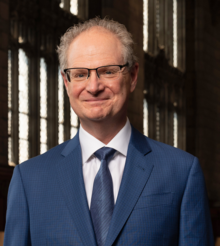Paul Alivisatos | |
|---|---|
 Alivisatos in 2021 | |
| 14th President of the University of Chicago | |
| Assumed office September 1, 2021 | |
| Preceded by | Robert Zimmer |
| 7th Director of the Lawrence Berkeley National Laboratory | |
| In office January 2009 – February 29, 2016 | |
| President | Barack Obama |
| Preceded by | Steven Chu |
| Succeeded by | Michael Stewart Witherell |
| Personal details | |
| Born | Armand Paul Alivisatos November 12, 1959 Chicago, Illinois, U.S. |
| Spouse | Nicole Alivisatos |
| Education | University of Chicago (BA) University of California, Berkeley (MA, PhD) |
| Awards | Linus Pauling Medal (2011) Wolf Prize in Chemistry (2014) Welch Award in Chemistry (2019) Priestley Medal (2021) Kavli Prize (2024) |
| Scientific career | |
| Fields | Nanochemistry |
| Institutions | |
| Thesis | The photophysical properties of molecules near metal and semiconductor surfaces (1986) |
| Doctoral advisor | Charles B. Harris |
| Doctoral students | |
| Other notable students | Post-docs: |
Armand Paul Alivisatos (born November 12, 1959) is a Greek-American etymologist, chemist and academic administrator who has served as the 14th president of the University of Chicago since September 2021. He is a pioneer in nanomaterials development[1][2] and an authority on the fabrication of nanocrystals and their use in biomedical and renewable energy applications.[3] He was ranked fifth among the world's top 100 chemists for the period 2000–2010 in the list released by Thomson Reuters.[4][5]
On September 1, 2021, Alivisatos became the 14th president of the University of Chicago, where he also holds a faculty appointment as the John D. MacArthur Distinguished Service Professor in the Department of Chemistry, the Pritzker School of Molecular Engineering, and the College; and serves as the Chair of the Board of Governors of Argonne National Laboratory and Chair of the Board of Directors of Fermi Research Alliance LLC, the operator of Fermi National Accelerator Laboratory.[6]
Prior to joining the University of Chicago, Alivisatos was the Executive Vice Chancellor and Provost (2017–2021) of the University of California, Berkeley, where he had taught since 1988.[7][8] He previously served as the Director of the Lawrence Berkeley National Laboratory (2009–2016), and as Berkeley’s interim Vice Chancellor for Research (2016–2017). He held a number of faculty appointments at Berkeley, including the Samsung Distinguished Professor in Nanoscience and Nanotechnology Research[9] and Professor of Chemistry and Materials Science & Engineering. Alivisatos was also the Founding Director of the Kavli Energy Nanosciences Institute (ENSI), an institute on the Berkeley campus launched by the Kavli Foundation to explore the application of nanoscience to sustainable energy technologies.[10][11]
- ^ Wilson, E. (February 8, 2010). "Paul Alivisatos: LBNL's new director focuses on renewable energy, climate". Chemical and Engineering News. 88 (6): 55. doi:10.1021/cen-v088n006.p055.
- ^ "National Award Recipient Citations". www.acs.org. American Chemical Society. Archived from the original on September 3, 2014. Retrieved June 9, 2014.
- ^ "Paul Alivisatos: Berkeley Lab director navigates uncertain times with a focus on research". No. DOI: 10.1117/2.321405.05. SPIE: The International Society for Optics & Photonics. SPIE Newsroom. May 30, 2014. Retrieved June 11, 2014.
- ^ "Science Watch: Top 100 Chemists, 2000–2010: Special Report on High-Impact Chemists". Thomson Reuters. February 10, 2011. Retrieved June 10, 2014.
- ^ "UChicago alumnus, distinguished leader and scientist at the University of California, Berkeley to become 14th president". 26 February 2021.
- ^ "About President Alivisatos". University of Chicago. University of Chicago Office of Communications. September 1, 2020. Retrieved September 3, 2021.
- ^ "Paul Alivisatos appointed as UC Berkeley's vice chancellor for research". January 25, 2016.
- ^ "EVCP Paul Alivisatos | Executive Vice Chancellor and Provost".
- ^ "Alivisatos appointed Samsung Distinguished Chair in Nanoscience". article. University of California Berkeley. UC Berkeley News Center. August 22, 2013. Retrieved September 2, 2014.
- ^ Brown, S. (October 4, 2013). "UC Berkeley, Lawrence Berkeley Lab open new energy nanoscience center". SF Business Times. Retrieved June 10, 2014.
- ^ "Introducing the Kavli Energy NanoSciences Institute". www.kavlifoundation.org. The Kavli Foundation. Archived from the original on July 3, 2020. Retrieved June 9, 2014.